What are the Highest Paying Finance Companies for MBAs?

Let’s face it: even if money isn’t the number one reason you are looking into an MBA, it’s probably pretty high on the list. We know that earning an MBA can not only lead to a raise in salary, but can open the door to even more career opportunities that can further increase your earning potential. For those with money on the mind, there’s a lot to consider when pursuing your MBA, from which specialization will give you the most ‘bang for your buck’ to what kind of future employers most value their MBAs.
One of the top industries that consistently makes the list when looking for the most valuable MBA specializations is finance. With an average salary of $121,000 USD for jobs within the finance industry, having or working towards your MBA is a reality of the field. But for those who are willing to put in the work, finance companies are willing to pay.
The 5 Best Paying Finance Companies For MBAs
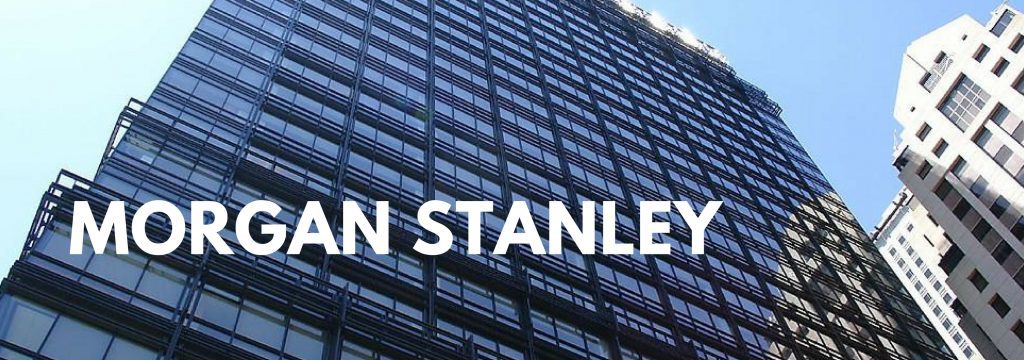
One of the places where MBAs are earning top dollars is Morgan Stanley, a financial services firm that provides a number of financial advising services, such as wealth management, investment banking, sales and trading, research, and more. Morgan Stanley is an active recruiter of diverse business school and MBA graduates, with their most recent cohort of recruits coming from 56 different countries. The company offers graduates a number of different ways to get their foot in the door, including a number of summer internships and fellowships designed specifically for MBAs.
It’s clear that Morgan Stanley believes in investing in the MBAs on its staff. While the average salary at the company is in the $75,866 range for those with just a bachelor’s degree, employees have reported average salaries around $100,477 after earning an MBA.
Depending on the job and department within the company, earning potential can be even higher. Within the firm’s investment banking department, salaries can reach over $200,000. One reason for Morgan Stanley’s high numbers come from their reputation to dole out tremendous bonuses, which—combined with the base salary—makes this company one of the highest paying firms for MBAs in finance.

Godman Sachs Group, Inc., a multinational finance company that focuses in global investment banking, investment management, securities, and a number of financial services. Founded in 1869, the company today has 34,000 employees throughout the world and revenue of more than $42 billion. Goldman Sachs makes a number of opportunities available to recent MBA graduates and current students, such as the Goldman Sachs MBA Fellowship which recognizes outstanding business students with a role as summer associate and $35,000 award in addition to the associate’s salary.
According to Payscale, MBA holders at Goldman Sachs earned a median salary of $96,844. With such a high number of diverse MBAs working for their organization, this average includes the salaries of finance managers, CFOs, financial analysts, financial controllers, and many other positions that MBAs might hold within the company.
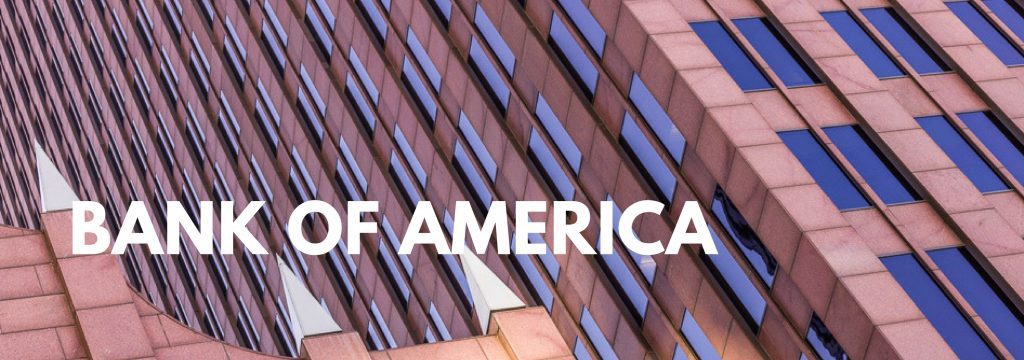
Bank of America began more than a hundred years ago, undergoing a series of expansions and mergers that ultimately led the company to its role as one of the ‘Big Four’ banks of the United States. Today, Bank of America makes more than $87 billion in revenue and employees a whopping 208,000 employees throughout the world. Through campus recruiting, diversity fellowships, and summer internships, Bank of America actively seeks talented MBA students and recent graduates. Through the full time analyst and associate programs, graduates work full-time in a structured program that offers consistent training, development, and social opportunities.
Bank of America employees with MBA degrees report an average salary of $101,522. Programs dedicated to hiring and training MBAs, such as the Bank of America MBA Leadership Development Program, matches these exceptional salaries, offering recent graduates impressive professional development opportunities as well as salaries ranging from $94,918-$101,733.

Headquartered in Zürich, Credit Suisse Group is a multinational financial services holding company with a heavy presence in the United States. With more than 48,000 employees worldwide, Credit Suisse in 2014, was said to hold more than $888 billion of assets under management. Credit Suisse offers several pathways for MBA graduates to become involved at their company, offering positions as full-time analysts, associates, and career starters.
Depending on the role, there can be a wide range of salaries recent graduates might earn when they join Credit Suisse in an analyst positions. Positions like investment banking analyst or business analyst are likely to make upwards of $70,000-80,000, with the opportunity to turn your degree into much more as you move up through the ranks. The average salary for an MBA with a finance specialization, according to Payscale, is $120,414.
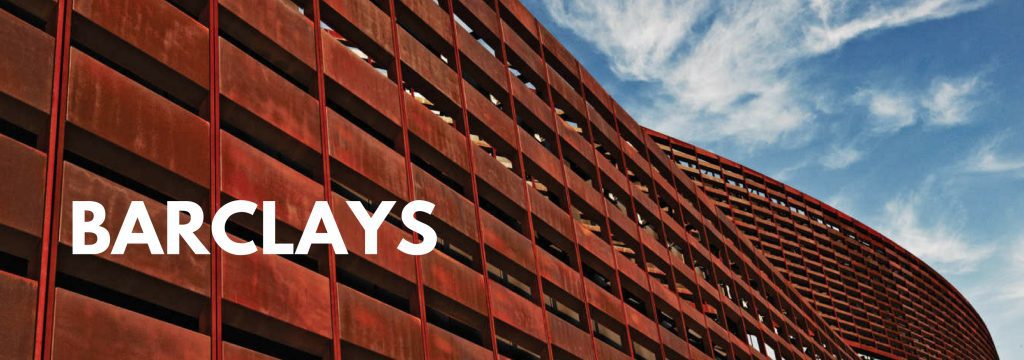
Barclays, a British multinational bank and financial services company, is well-known today for its global reach, employing more than 120,000 people and operating in more than 40 countries. Like the other high-paying financial firms on this list, Barclays offers a number of opportunities to draw talented MBA graduates to their company. Programs like Barclays MBA Ambition gives MBA candidates the chance to get a summer internship at the company even before beginning their program, allowing them to focus fully on school once it starts while feeling confident about the future. This fellowship, for example, offers $45,000 toward first-year tuition with the opportunity for an additional $45,000 in their second year if they choose to join Barclays full-time after graduating. On average, salaries for recent graduates can range from $69,588-$74,898.
2018 Trends: New York City’s MBA Future

It doesn’t take a stable genius™ to figure out that New York City is the world’s most highly sought-after 22.82 mi² strip of land to pursue an MBA.
As is the case with most prime real estate, the stakes are high and the competition fierce. For many prospective business schoolers, the decision to step into the gauntlet is one made with a healthy sort of trepidation.
Hefty price tags and cutthroat admissions present real barriers for prospective students and deter more than a few. Still, many equate the New York MBA experience to a dream scenario—or a Gordon Gecko-style fantasy, replete with the promise of a staggering salary, an attractive range of employment opportunities, and prime placement in a city of constant progress.
How does the dream stack up to reality? Schools weigh in on 2017 trends for graduates, many of whom report satisfaction with employment offers. Let’s take a look at how MBA graduates are getting the most of their newly minted degrees!
2018 New York City MBA Trends
Columbia Business School
According to the school’s most recent MBA employment report, less than 2 percent of Columbia Business School graduates reported salary as the primary reason for accepting an offer. While the honestly of that polling answer pool is debatable, Columbia School of Business is the king when it comes to starting salaries on our list, with median salary of $125,000. Of the graduating class, 93.2 percent of students accepted employment offers within three months. Approximately 28 of 1,019 total students stepped aside to create their own companies. Per the standard with many of the NY-area schools, the largest portion of graduates selected financial services (34.4 percent) as their field of choice, followed closely by consulting (33.1 percent) and media and technology (15.6 percent). Companies such as McKinsey & Company, Amazon, Goldman, Sachs & Co., and Morgan Stanley welcomed a majority of Columbia’s finest.
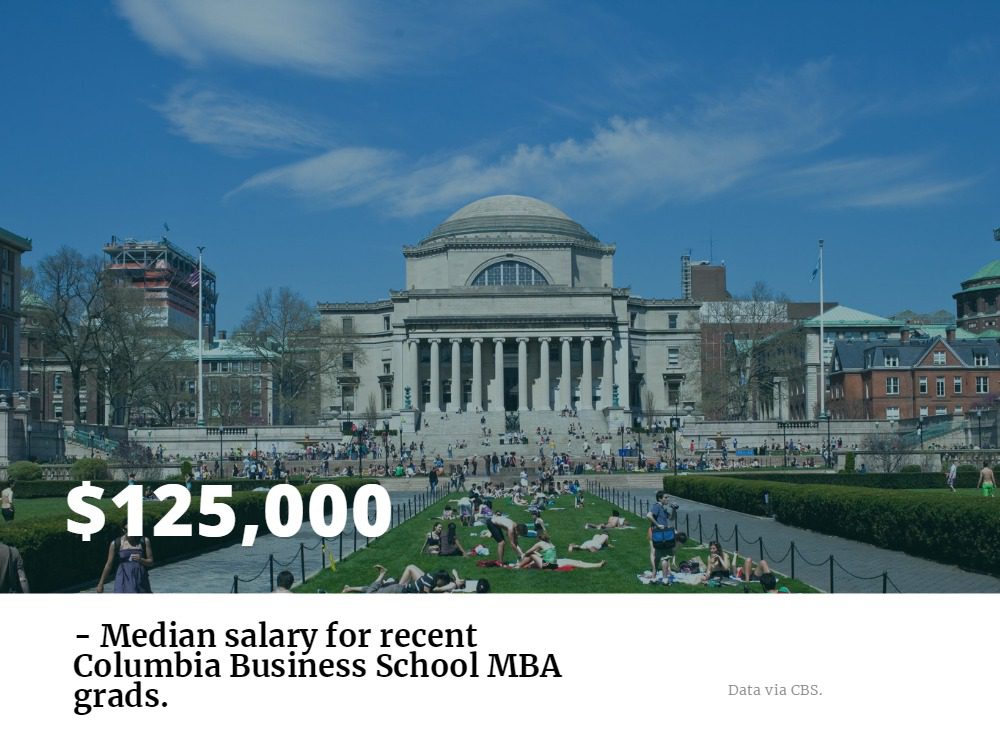
The boastful salary expectations, unsurprisingly, are tempered a bit by the costs of the CBS MBA program. The current estimated budget for Columbia MBAs comes in at $107,749 in the first year, of which includes over $21,000 for room and board. Tuition in isolation, however, costs $71,544 for the first year. Looking at a degree at any New York City school, never mind an Ivy League institution, means cost of living has to be taken in heavy consideration, which can vary greatly from borough to borough.
Fordham University’s Gabelli School of Business
About 88 percent of students in the Fordham Gabelli School of Business graduating class accepted employment offers within six months after graduation. Starting salary rates were below Columbia’s, at an average of $84,593, with an average signing bonus of $15,536 and additional compensation of $14,510. That average salary figure is an approximate 13 percent drop from the previous year’s reported averages.
Out of the many fields MBA students typically chose this year, Fordham students favored less predictable fields: just under 50 percent went into financial services, while 11 percent earning employment in consumer products, technology, and media, respectively. Unlike MBA graduates from many other NYC schools, however, only 5 percent of Gabelli students went into consulting, signifying a deeper trend of tech continuing its encroachment on MBA talent.
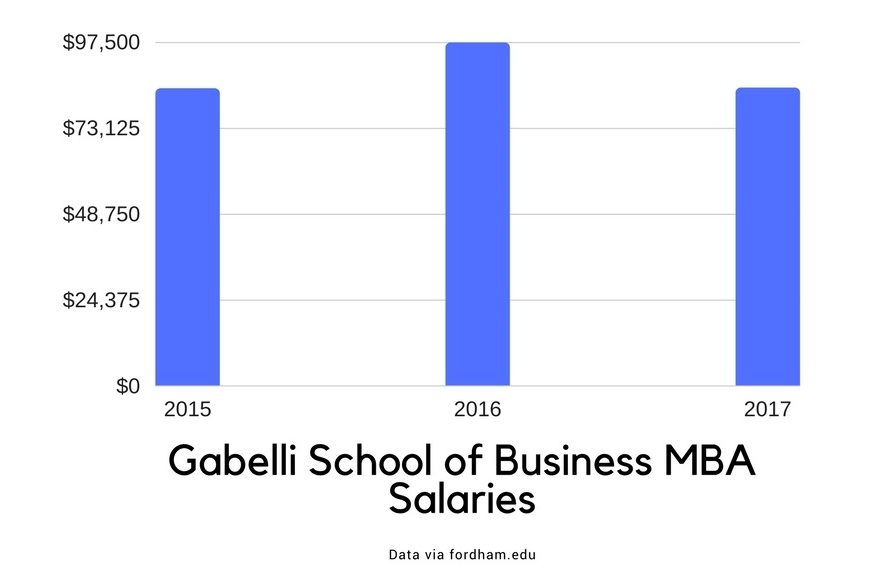
Compared to many other schools on this list, Gabelli’s distinct advantage is cost. The first year of the MBA program currently costs $49,645: more than 30 percent less than the cost of the Columbia full-time MBA tuition.
NYU Stern School of Business
This may shock you, but, NYU Stern MBA students are doing pretty well, with an average starting salary of $121,146 in placement of some of the most prestigious institutions in finance (32.4 percent), consulting (26 percent), technology (16.8 percent), real estate (3.5 percent), and retail (3.2 percent). Around 83 percent of those students landed jobs in the Northeast U.S., while nearly 10 percent of graduates found positions in Asia, Europe, and South America. Nearly half of all job offers were the result of an internship facilitated by NYU.
Like the trend at Gabelli, NYU grads jumping into tech has been steadily climbing over the past few years, rising from just 6 percent of employed grads from the Class of 2014, to 17 percent for the most recent class. The incremental increase coincides with the school’s recently added Tech MBA.
Stevens Institute of Technology School of Business
In a metro brimming with very successful business schools, the Stevens Institute of Technology School of Business separates itself with an incredible employment placement rate of 94.9 percent; the best placement among all business schools in the country, according to U.S. News & World Report.
The Stevens MBA faculty claim to provide “exceptional career services much earlier than other universities.” 90 percent were employed in the industry of their choice. Starting salaries fell between $88,805—$125,000. Companies such as Goldman Sachs, Protiviti, PwC ,and Prudential offered employment opportunities for these students.
Cornell University’s SC Johnson Graduate School of Management
About 93 percent of students from Cornell‘s Ithaca and NYC campuses received employment offers within six months of graduation. The average base salary was $125,578, which was an increase from previous years “driven by salary growth in consulting and finance.” Chosen fields for students were finance (38 percent), consulting (26 percent), and general management (21 percent). Out of the 122 companies that sought 2017 graduate students, the top recruiters were Citi Group, Amazon, Deloitte Consulting LLP, Ernst & Young, and McKinsey & Company.
Even Cornell MBA students in an internship were earning some of the best salaries in the country, pulling in a reported $8,764 per month. Those figures out over a 12-month rate are more than triple the average intern salary, according to Glassdoor data.
The Top 5 Reasons Diversity MBA Conferences Should Be on Your Recruiting Calendar

Pictured above: Tuck second-year MBA students Bianca Goins, Sadé Lawrence, and Jodine Gordon.
More than 10,000 MBA students, business school representatives, recruiters, and business executives filled the Pennsylvania Convention Center in Philadelphia late last month for one of the largest career conferences serving minority professionals. The conference has been around since 1970, but for the first time this year the National Black MBA Association (NBMBAA) and Prospanica, the association of Hispanic professionals, joined forces to present it. The result was an incredible opportunity for attendees to network with companies and each other, take advantage of career development programming, and interview for and secure job offers from hundreds of companies spanning multiple industries.
Cornell’s S.C. Johnson Graduate School of Management had a group of approximately 55 students attend, a mix of first-year and second-year students, according to Cynthia Saunders-Cheatham, Executive Director of Johnson’s Career Management Center.
“It was double what we have had in recent years, and perhaps the largest attendance we ever had for an MBA diversity conference,” she said. “Having a joint NBMBAA/Prospanica conference, in addition to the Philadelphia location that was driving distance away [from Ithaca, NY, where Johnson is located], helped to drive attendance.” The connections that students made while there have already resulted in multiple job offers, she added.
While securing a job or internship is a primary reason many MBA students choose to attend the National Black/Prospanica conference and others like it, that’s just one of many potential benefits events like this offer. Given that this most recent conference was right here in our hometown of Philadelphia, we went to check things out for ourselves. Through conversations with attendees, school representatives, and recruiters, we’ve compiled the following list of reasons why this year’s crop of applicants should be sure to add diversity MBA conferences to their recruiting calendar next summer and fall.
1. Unparalleled Recruiter Access—Including Many That Don’t Come to Campus
The Career Expo, which took place on the last two days of the five-day National Black/Prospanica conference, filled a cavernous hall in the Convention Center and included booths from close to 300 companies spanning dozens of industries. Among them were coveted post-MBA tech employers like Google and Amazon, consulting industry leaders including Bain & Company and Accenture, and financial services firms such as BlackRock, Bank of America, and Morgan Stanley. There was a continuous gaggle at the Google booth, and one of its MBA internship recruiters, Tanya Choudhury, had to resort to wearing a sign by the second day explaining that she’d lost her voice.
Big pharma and healthcare were also well represented, with booths attended by recruiting representatives from drug maker AstraZeneca to medical products and equipment company Zimmer Biomet and many in between. Leading consumer packaged goods (CPG) firms including PepsiCo, General Mills, and Proctor & Gamble were also there, as were oil and gas giants like BP, Chevron, and Exxon.
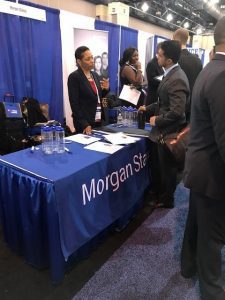
Morgan Stanley was one of almost 300 exibitors in the conference’s packed Career Expo.
But there were also plenty of organizations that are perhaps less top of mind as potential MBA recruiters—the Central Intelligence Agency, the U.S. Department of State, Teach for America, and USAID, for example—who were just as eager to share how highly they value the MBA skillset. Dozens of leading business schools also had booths, largely to provide support and serve as gathering places for students who were attending, but also with an eye out for promising diverse talent. For example, Roberto Martinez, a Senior Talent Acquisition Consultant for Dartmouth College—home to the Tuck School of Business—was eagerly distributing glossy handouts touting the school’s varied career opportunities, commitment to diverse hiring practices, and excellent benefits. “We’re here not only to support students but also to hire more diverse staff to campus,” he said.
For Tuck second-year MBA student Bianca Goins, the breadth of companies at the expo was a big part of the draw. “I wanted a diverse group of companies to look at in a single spot,” she said. “There are so many companies here, and as second-year you can really come and pick and choose the experiences you want to have.”
Tiffany Anderson, a second-year student at Emory’s Goizueta Business School, was also impressed by the sheer number of companies present. A self-proclaimed conference veteran, she also attended National Black last year, as well as conferences presented by the Forté Foundation, the Consortium for Graduate Study in Management, Management Leadership for Tomorrow, and JumpStart. “Out of all the diversity conferences, I would certainly say this is the flagship,” she said. “Wow! There are A LOT of companies here,” she recalled thinking to herself as she walked in. More so than last year, before National Black and Prospanica teamed up, she added.
“I have seen the most people—students from many different schools and recruiters from many different functional areas of interest,” she continued. “It seems to be the most diverse in terms of attendees, degree of programming, and companies in attendance. For the majority of people, this is going to be one of the best to attend.” Anderson estimates that there were probably 30 or so Goizueta students there, a mix of first- and second-years.
2. Multiple Touch Points and Opportunities for Face Time
For some students, certainly, the primary purpose in attending the conference is to land a job. Second-year IU Kelley School of Business MBA student Henrique Barbosa, a native of Brazil pursuing travel hospitality, had a simple answer when asked why he was there: “To get a job!” He acknowledged that most of the firms he was interested in only conduct first-round interviews at the conference followed by second-round interviews on site, which lessened the likelihood of his leaving with an offer in hand. “But it would be great if it happened,” he said.
But several other students were less interested in job or internship offers—or even in early round interviews. For Jodine Gordon (Tuck ’18), the biggest factor in her decision to attend was hearing success stories from Tuck grads whose higher-level touch points with conference recruiters later helped them secure offers. “I have a couple companies on my list, but really I just want to meet as many people as possible so they can get to know me and I can get face time,” she said.
Sadé Lawrence, also a second-year student at Tuck, was likewise attracted by the opportunity to get in front of recruiters in person. “For a lot of opportunities you might be interested in, you start online at a website, applying through data base,” she said. “But coming here they now have a face with your name, and there are all kinds of organic connections that can happen,” she added. “It’s kind of amazing that you are able to build connections with people even at such a big conference, but you are. You make contacts and get lots of face time—so much more so than you can blindly through a website,” she continued. “What I have heard more of is people have an interaction with a recruiter here that leads to an interview later—here is more about entering the pipeline.”
Tuck’s Goins has taken the opportunity to network with recruiters who don’t make it to Tuck’s campus, but also those who do. “With every interaction, you are getting a more nuanced understanding of the company and can take that information and use it in subsequent interactions.”
3. Valuable Chances to Network with Peers
Goizueta’s Anderson interned in operations at Google over the summer—an opportunity she got through another diversity conference—and has been offered a full-time position on the tech giant’s Mountain View campus after she graduates. Despite having that full-time offer in hand, attending the conference still made lots of sense.
Kelley School second-year student Luis Vilchez Kupres, a native of Peru, also converted his summer internship—in supply chain operations at Cummins—into a full-time offer. So his reasons for attending the conference were not to get a job. ”I am here to support fellow Kelley first- and second-years and network a little more,” he said. He also gets to reconvene with students from other schools he met at last year’s Prospanica conference. “Often, you connect with somebody and they will help you connect with someone else,” he said. “Networking definitely helps—even among other MBA students.”
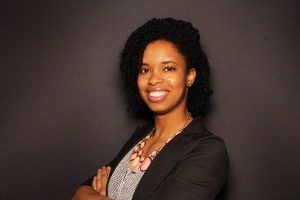
Tiffany Anderson, Goizueta MBA ’18, a diversity MBA conference veteran
For the Google-bound Anderson, the value of peer networking can’t be stressed enough. Being able to connect with students from other schools is the part she finds most enjoyable—but it’s also strategic. “When candidates are selecting a school they like to look at the size of the network they are going to get—and that’s great,” she said. “But the way I see it, I don’t have to be at Stanford or Wharton because I have friends at Stanford and Wharton. So in a way that’s kind of my network, too.”
“You have that domino effect,” she continued. If she’s trying to connect with someone at a company where she doesn’t have a contact or her classmates don’t have contacts, she can reach out to a friend at another school to see if there’s someone in their network. “Some might say, ‘Well, they’re a peer, they’re not an employer, they’re not going to get me a job.’ But there is so much more benefit to expanding your network. I don’t think everyone understands that.”
Of course, peer networking can be a two-way street. “My motivation to expand my network comes from wanting to help others as well,” Anderson said. “When you are part of these diversity networks, one of the great things is you are going to have a friend who says, ‘Do you know someone who can help me with this?’ And I can say, ‘Well, I met someone at a conference who does that very thing and I’m happy to put y’all in touch.’”
Vault’s Top Investment Banks for MBAs to Work for in 2018

While a career in investment banking may not be as highly sought after anymore among MBAs, it’s still a fairly popular option. And according to a U.S. News interview with Jeff McNish, Assistant Dean of the Career Development Center at the University of Virginia’s Darden School of Business, investment banks and consulting firms are raising their compensation offers to draw in more students. These companies are willing to pay a premium to draw MBA talent. The question is, which are the best investment banks to work for?
Vault Banking 50 recently released its annual ranking of the best investment banks in North America. The list was compiled through a survey of 2,400 banking professionals and used a weighted formula to review such issues as quality of life—including culture, satisfaction, work/life balance, training, and compensation—and overall prestige.
This year, Goldman Sachs took the #1 spot—with a score of 8.380—maintaining its title of “best investment bank to work for.” Coming in at a close second was Evercore (8.311), followed by Centerview Partners (8.308), and Morgan Stanley (8.114).
The top 10:
- Goldman Sachs
- Evercore
- Centerview Partners
- Morgan Stanley
- Moelis & Company
- Greenhill & Co.
- Lazard
- Perella Weinberg Partners
- Bank of America
- PJT Partners
Goldman Sachs Still #1
This was the second year in a row that Goldman Sachs took the top spot, with survey responders saying such things as: “The firm is extremely focused on improving work/life balance. In the time that I’ve been here, I’ve seen a tremendous difference, not only as a result of formal policies but also in the culture and mindset of those who work here.”
Respondents also said that Goldman Sachs provided workers with various benefits including “exposure to talented, thoughtful, respectful colleagues” and “challenging, intellectually stimulating assignments.” Even respondents at Goldman Sachs’ competitors had mostly nice things to say. They called the firm “a finance machine” and “the gold standard.”
Other elements that set Goldman Sachs apart include its protected-weekend-day policies for junior bankers, no-working-past-midnight policies for interns, and fast-track promotions. It was also one of the first banks to provide a modern performance review system as well as to implement video interviews during on-campus recruiting.
Other Investment Banks Making Waves
As for Evercore, it rose two places in 2018 from #4 to #2. Much of its rise in placement was due to its increase in prestige as well as the company’s focus on a better working environment for its employees. In fact, Evercore came in first place in two areas: formal training and informal training.
As for what some of the survey respondents had to say about Evercore: “We have an outstanding, very teamwork-oriented, and collaborative culture. The firm is filled with very intelligent people treating each other with respect and working together to give clients the best advice possible. The atmosphere is very positive—lots of high fives on wins and no dressing-down calls if you miss a piece of business.”
In third place, Centerview Partners is a small boutique investment banking firm. Insiders stated that the firm is filled with “extremely talented, smart, and thoughtful senior bankers” and that “deal opportunities are unparalleled.”
Another boutique investment bank to make it to the top of the list was Moelis, which ranked fifth. The firm rose four places this year thanks to its “great culture” and “smart dedicated people.”
Investment Banks Focused on Diversity
The Vault Banking 50 also measured firms’ focus on diversity. Loop Capital Markets led the way for the second year in a row, coming in first for overall diversity, minority diversity, female diversity, and LGBT diversity. However, following close behind were Evercore (which placed #2 in overall diversity, female diversity, and minority diversity) and Goldman Sachs (which placed #3 for overall diversity, minority diversity, and LGBT diversity).
To see the full report, visit the Vault.com.
This article has been edited and republished with permissions from Clear Admit.
Building a Career after Graduation: Columbia Business School

Huzzah! You made it through the b-school ringer! Now ready for the fun part? Finding a job!
MBA Alum Spotlight: Wharton Alum and Alphabet CFO Ruth Porat

In March 2015, the New York Times called Ruth Porat one of the most powerful women on Wall Street, and claimed she was poised to “immediately become one of the most powerful women in Silicon Valley” as CFO of Google’s corporate umbrella, Alphabet.
